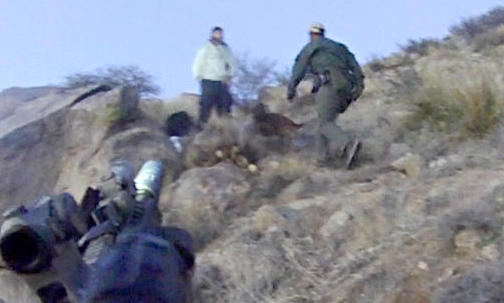James Boyd shooting death results in murder charges against 2 police officers, District Attorney Kari Brandenburg plans to file murder charges on Monday against the two Albuquerque police officers who shot James Boyd in the Sandia Foothills last March, according to multiple sources with firsthand knowledge of her decision.
The decision to bring murder charges occurred at a time when police tactics are under intense scrutiny nationwide, fueled by the fatal shooting of an unarmed 18-year-old in Ferguson, Missouri, and the chokehold death of another unarmed man in New York City. Grand juries declined to charge officers in those cases, leading to large protests.
Acknowledging the frustration over the secrecy of the proceedings in those cases, the Albuquerque district attorney said she would bypass the grand jury process and instead present the murder case to a judge at a preliminary hearing that will be open to the public.
“Unlike Ferguson and unlike in New York City, we’re going to know. The public is going to have that information,” District Attorney Kari Brandenburg said.
Police said SWAT team member Dominique Perez and former detective Keith Sandy fatally shot James Boyd, a mentally ill homeless man who had frequent violent run-ins with law enforcement. Video from an officer’s helmet camera showed Boyd appearing to surrender when officers opened fire, but a defense lawyer characterized him as an unstable suspect who was “unpredictably and dangerously close to a defenseless officer while he was wielding two knives.”
“I’m looking forward … to the DA’s office presenting one single witness that says this is murder,” said Sam Bergman, a lawyer for Sandy.
The district attorney refused to provide specifics about the reasons for bringing the case, but said it was a lengthy and deliberate process involving several members of her staff.
Each officer faces a single count in the March death of the 38-year-old Boyd. The charges allow prosecutors to pursue either first-degree or second-degree murder against the officers.
Even before Boyd’s death, the U.S. Justice Department was investigating the use of force by Albuquerque police. The department recently signed an agreement to make changes after the government issued a harsh report. The agreement requires police to provide better training for officers and to dismantle troubled units.
Since 2010, Albuquerque police have been involved in 40 shootings — 27 of them deadly. After Boyd’s death, outrage over the trend grew and culminated with protests that included a demonstration where authorities fired tear gas and another that shut down a City Council meeting.
The criminal charges were the first Brandenburg has brought against officers in a shooting. She is in her fourth term as district attorney and is waging a fight with the Albuquerque Police Department over allegations that she committed bribery while intervening on behalf of her son in a burglary case.
Police believe she should be charged with bribery because, they say, she offered to pay a victim not to press charges. The attorney general’s office is handling the matter.
Brandenburg said the charges against police had nothing to do with the agency’s investigation into her and that her office got the case long before the bribery claims came to light.
The next step in the case will be a preliminary hearing where a judge will decide whether the case can proceed. The officers have not been arrested. That would not happen until a judge renders a decision at the preliminary hearing. A date has not been set.
Brandenburg has been criticized for her office’s decades-old practice of using grand juries to affirm prosecutors’ decisions that no probable cause existed to charge officers in shootings.
Under a revamped system, county prosecutors now decide whether there’s probable cause that a crime was committed and either take the case to a grand jury or opt to file a “criminal information” charge on their own.
Bergman said there is “not one shred” of evidence to support the case and insisted the officer had no criminal intent when he encountered Boyd. He said Sandy followed training procedures outlined by the police department.
Luis Robles, an attorney for Perez, said he was “confident that the facts will vindicate officer Perez’s actions in this case.”
The FBI is also investigating, but U.S. authorities have not said if the officers will face federal charges.
David Correia, a police critic and an American studies professor at the University of New Mexico, said he was pleased that Brandenburg finally brought charges against Albuquerque officers after years of pressure.
“This is the first time an independent agency is holding Albuquerque police accountable,” Correia said.
Police are legally empowered to use deadly force when appropriate, and a 1989 Supreme Court decision concluded that an officer’s use of force must be evaluated through the “perspective of a reasonable officer on scene rather than with the 20/20 vision of hindsight.”
Philip Matthew Stinson, a professor at Bowling Green State University in Ohio who studies police misconduct, found that local officers were charged in 41 cases with murder or manslaughter stemming from on-duty shootings between 2005 and 2011. By comparison, over the same period, police agencies reported more than 2,700 cases of justifiable homicide by law enforcement officers to the FBI, and that statistic is incomplete.
The figures suggest it’s difficult to get a conviction “because juries are so reluctant to second-guess an officer’s split-second decision,” Stinson said.
Agencies/Canadajournal
 Canada Journal – News of the World Articles and videos to bring you the biggest Canadian news stories from across the country every day
Canada Journal – News of the World Articles and videos to bring you the biggest Canadian news stories from across the country every day



